Finding Quality Second Hand Mortuary Fridges: What You Need to Know
Let's face it – equipping a funeral home or mortuary can strain any budget. That's why many directors are turning to second hand mortuary fridges as a smart alternative. I've helped countless funeral professionals find reliable pre-owned units, and I'm here to share what really matters in this decision.
When you're considering a used mortuary cooler, you're looking at prices typically ranging from $1,600 for smaller units to around $6,000 for larger capacity models – a substantial savings compared to new equipment. Most facilities find what they need among the common options: 2-body, 3-body, 4-body, 6-body, or the larger 8-12 body units, depending on their specific needs.
| Key Considerations for Second Hand Mortuary Fridges |
|---|
| Price Range: $1,600-$6,000 depending on capacity and condition |
| Common Capacities: 2-body, 3-body, 4-body, 6-body, and 8-12 body units |
| What to Inspect: Compressor condition, insulation integrity, door seals, temperature control accuracy |
| Expected Lifespan: 10-15 years for well-maintained units |
| Key Benefits: Budget savings (40-70% off new price), immediate availability, sustainability |
A well-maintained second hand mortuary fridge can serve your facility reliably for 10-15 years. These specialized units are designed specifically for preserving human remains at precise temperatures – typically between 2-4°C for standard units or -10 to -50°C for negative temperature freezers. The substantial cost savings (often 40-70% off new prices) makes them particularly attractive for smaller operations or those looking to expand capacity without breaking the bank.
But price shouldn't be your only consideration. I've seen too many funeral directors focus solely on the initial savings, only to face headaches down the road. The unit's age, structural integrity, insulation condition, and mechanical reliability all play crucial roles in determining whether your purchase will truly deliver value. A thorough inspection before buying can save you thousands in unexpected repairs.
I'm with American Mortuary Coolers, and we've built our reputation helping funeral directors steer these important decisions. Our experience with mortuary refrigeration across the country has taught us exactly what separates a reliable pre-owned unit from one that might create endless problems for your operation.
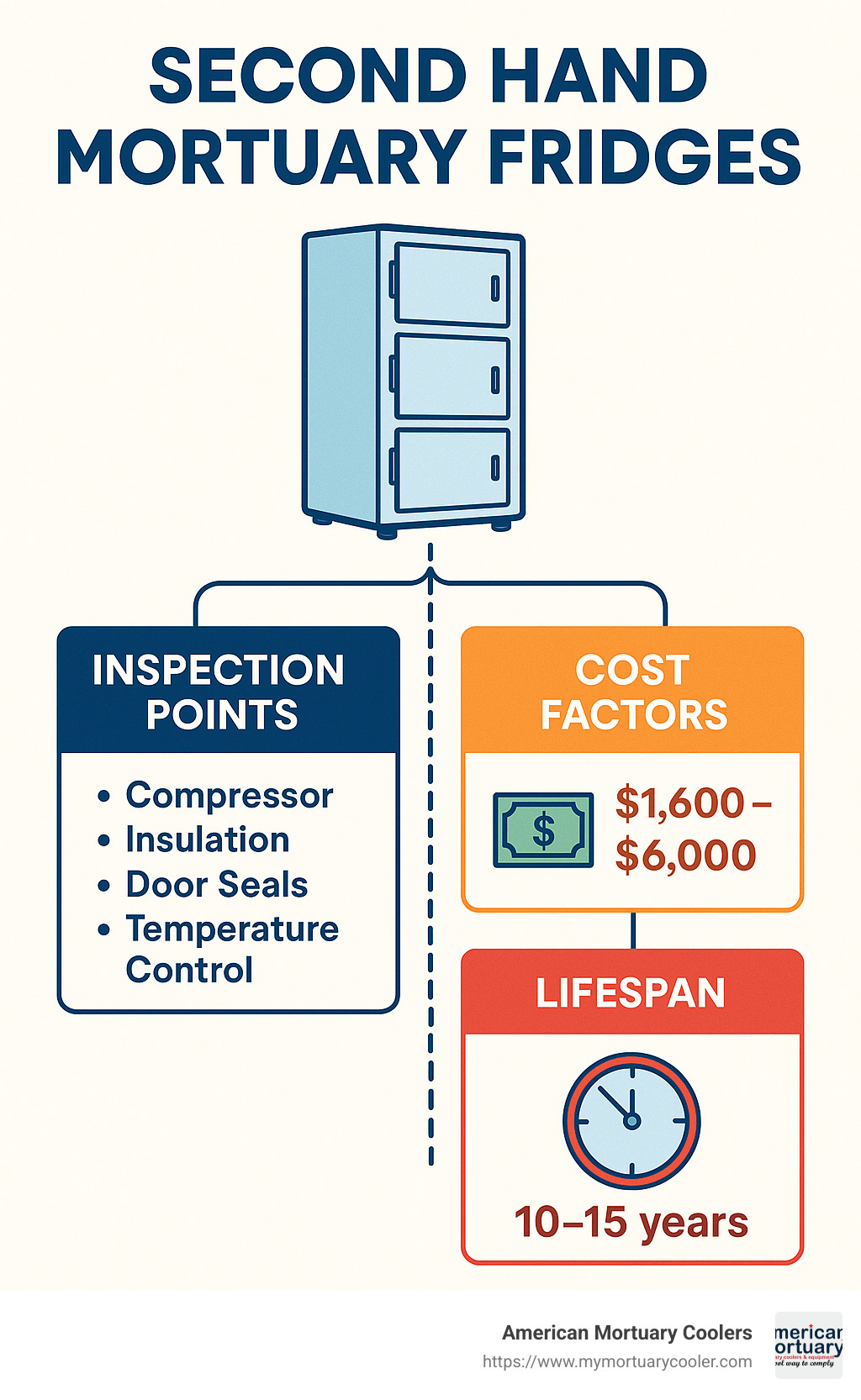
You might also be researching related terms like funeral home fridge, morgue refrigeration equipment, or even wondering about practical questions like do refrigerated bodies at hospital morgues smell bad – all important considerations when making this investment.
What You'll Learn
Throughout this guide, I'll walk you through everything you need to know before investing in a second hand mortuary fridge. We'll cover the practical aspects that make a real difference:
I'll show you how to evaluate the condition and remaining lifespan of used units – because that compressor might look fine now, but what about six months from now? We'll discuss the regulations and standards that apply specifically to second-hand equipment, so you can avoid compliance headaches.
You'll get a practical inspection checklist that goes beyond the basics, covering things even experienced buyers sometimes miss. I'll share insider tips on finding reputable sellers (and avoiding the ones who might leave you with problems). Plus, you'll learn the best practices for delivery, installation, and ongoing maintenance that extend your unit's life.
Perhaps most importantly, we'll tackle the critical hygiene and safety considerations unique to purchasing used mortuary equipment – because dignity and safety are never areas to compromise.
By the time you finish reading, you'll have the confidence to make a choice that balances your budget needs with the essential requirements of reliable preservation equipment. After all, in our profession, dependability isn't just convenient – it's necessary for providing the respectful care families deserve.
What Is a Mortuary Fridge and Why It Matters
A mortuary fridge (sometimes called a mortuary refrigerator, morgue cooler, or cadaver freezer) is more than just a specialized cooling unit – it's a critical tool for providing dignified care to those who have passed. Unlike your kitchen refrigerator or even commercial units, these specialized fridges are thoughtfully designed with one purpose in mind: preserving human remains with respect and care.
When you see a second hand mortuary fridge, you're looking at something built specifically for the funeral industry's unique needs. These units typically feature gleaming stainless steel construction (usually grade 304 or 316) that's not just about looks – it provides durability and makes thorough cleaning easy. The thick polyurethane insulation (typically 80mm) works hard behind the scenes, maintaining precise temperatures while keeping energy costs manageable.
"A mortuary cold room is a specialised refrigeration unit designed to store human remains at low temperatures," explains industry expert Lane Shannon. "The design and functionality reflect the importance of treating the deceased with respect."
What sets these units apart is their attention to detail – from body trays designed for dignified handling to robust chrome-plated handles and hinges built to withstand years of daily use. Digital temperature controls aren't just convenient; they're essential for maintaining the precise environment needed for preservation.
The Role in Funeral & Mortuary Services
In the day-to-day operations of a funeral home, these specialized refrigeration units are true workhorses. Their primary job is preservation – slowing decomposition by maintaining bodies at temperatures between 2-4°C. This buys precious time for families to make arrangements, for loved ones to travel from far away, and for funeral directors to prepare meaningful services.
But their role extends beyond basic preservation. Second hand mortuary fridges provide appropriate storage for remains awaiting identification, support autopsy and forensic examination needs, and maintain bodies in appropriate condition for family viewing – one of the most important moments in the grieving process.
"Mortuary fridges extend viewing periods so families can schedule services without decomposition concerns," notes a funeral industry publication. This flexibility becomes particularly meaningful when family members need to travel long distances or when religious and cultural practices require specific timing for funeral rites.
For funeral directors juggling multiple cases, these units are essential for workflow management. They provide the peace of mind that comes from knowing each person in your care is being preserved with dignity while awaiting their final arrangements.
Positive vs Negative Temperature Units
When exploring the second hand mortuary fridge market, you'll encounter two main types of units, each serving different needs:
Positive Temperature Units (2-4°C) are the workhorses of most funeral homes. They maintain bodies just above freezing, slowing decomposition while keeping remains in a more natural state for viewing. They're energy-efficient and perfect for the typical short to medium-term storage needs (days to weeks) of most funeral operations.
On the other hand, Negative Temperature Units (-10 to -50°C) serve more specialized purposes. These freezer units are designed for long-term preservation or special circumstances like forensic cases. You'll find them more commonly in medical examiner offices, research institutions, and facilities with extended storage needs.
"At 2–4°C decomposition slows but does not stop; at −10 to −50°C bodies freeze and decomposition is minimal," explains a technical source in the industry. While negative temperature units provide more extensive preservation, they do consume more energy and require specific defrosting protocols.
The choice between these options really comes down to your specific operational needs and how long bodies typically remain in your care. Many funeral homes find that positive temperature units meet most of their daily requirements, while having access to a negative temperature unit provides helpful flexibility for special situations.
Mapping the Second Hand Mortuary Fridge Market
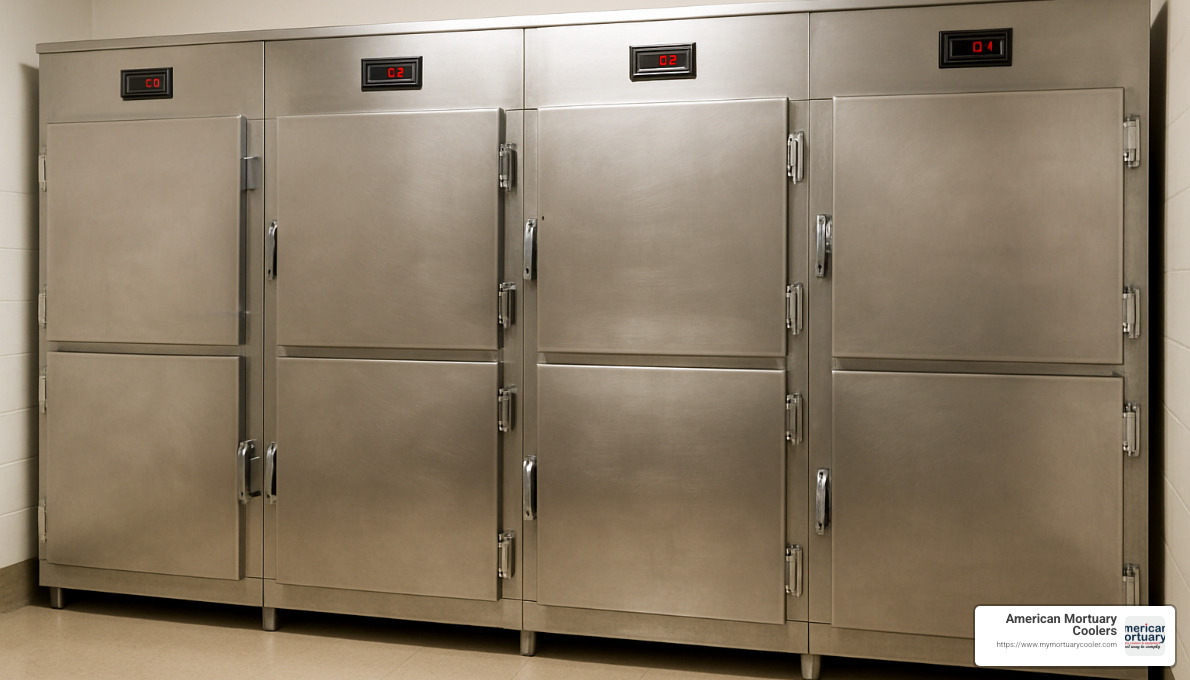
When I first started helping funeral directors find second hand mortuary fridges, I was surprised by how diverse and active this specialized market actually is. There's something uniquely satisfying about connecting funeral professionals with quality pre-owned equipment that meets their needs while saving them thousands.
The journey of a used mortuary cooler often begins when a funeral home closes its doors or upgrades to newer models. These gently-used units then find their way to new homes through several channels. Many of my clients have found excellent deals through industry connections when colleagues retire or expand. As one funeral director told me, "My best equipment came from a mentor who was updating his facility—it had years of life left and cost me half of retail."
Hospital and medical facilities regularly cycle out their mortuary equipment too, often on more predictable schedules than funeral homes. These institutional units typically have maintenance records and may have been serviced more regularly.
Online auctions have become increasingly popular for sourcing second hand mortuary fridges. I recently helped a client monitor an eBay auction where a quality used morgue refrigerator sold for $3,049 after 68 bids—showing just how competitive this market can be when a good unit becomes available.
Beyond these sources, many funeral directors check industry classifieds in publications like American Funeral Director or the free equipment exchange forums on funeral service websites. As one listing site explains, "This area is designed to be used for FREE by funeral directors and associates to sell second hand equipment," creating a helpful peer-to-peer marketplace.
There's also an environmental angle that shouldn't be overlooked. By purchasing second hand mortuary fridges, funeral homes make a meaningful sustainability choice. Each reused cooler means one less unit manufactured, saving the substantial resources and energy required to produce new equipment. It's a practical way for funeral homes to reduce their environmental footprint while making sound financial decisions.
Types and Sizes on the Used Market
Walking through the options for pre-owned mortuary refrigeration feels a bit like shopping for cars—there's a model for every need and budget. For the small family-owned funeral home just starting out, 1-2 body units provide an affordable entry point with the smallest footprint. I've helped many rural funeral directors find these compact units when their caseload doesn't justify larger equipment.
The 3-4 body units are the workhorses of the industry—common enough to find on the second-hand market but substantial enough to handle the needs of most medium-sized funeral homes. As one of my clients in a town of 25,000 people told me, "Our 3-body unit handles 90% of our busy weeks, and we only wish for more capacity during flu season."
Larger operations often seek out 6-body units, while the busiest metro-area facilities and those serving multiple locations might require 8-12 body capacity. The largest option—walk-in coolers—can be harder to find used but offer tremendous capacity when available.
Beyond just size, the configuration matters tremendously. Upright cabinet-style units have the smallest footprint but limited capacity. Side-loading refrigerators can be mounted along walls to save floor space. The most common design you'll encounter is the front-loading multi-body unit with horizontal trays. For facilities with variable needs, modular systems offer the flexibility to expand capacity as business grows.
"I always tell people to buy for where their business will be in five years, not where it is today," shares an industry colleague who specializes in equipment planning. That's sage advice considering the long service life of these units.
Typical Price Ranges & Cost Drivers
The financial advantage of choosing second hand mortuary fridges becomes clear when you compare prices. While a new 2-cadaver mortuary fridge might cost around $53,591, I've helped funeral directors find comparable used units in good condition for $1,600-$3,000—savings that can transform a funeral home's capital budget.
The price spectrum for used equipment generally follows predictable patterns based on capacity:
- 1-2 body units: $1,600-$3,000
- 3-4 body units: $2,500-$4,500
- 6-body units: $3,500-$6,000
- Walk-in coolers: $5,000-$15,000+ (with high variability based on size)
When comparing these figures to new equipment costs—where a 3-body unit runs $58,614-$69,758 and a 6-body fridge costs $69,200-$83,249—the 40-70% savings become a compelling reason to consider pre-owned options.
What drives these price differences? Age and condition naturally play major roles—a five-year-old unit with minimal wear commands a higher price than a 15-year-old workhorse. Brand reputation matters too, with premium manufacturers like Mortech and Mopec maintaining stronger resale values.
I've noticed that features significantly impact pricing as well. Digital temperature controls, high-grade 304 stainless steel construction, and specialized features like UV sanitization can add value to used units. When one of my clients found a gently-used unit with a transferable warranty and recent service records, they happily paid a premium knowing they were getting both savings and peace of mind.
The seller type also influences price—purchasing from specialized refurbishers typically costs more than buying directly from another funeral home, but often includes professional reconditioning and sometimes limited warranties that may justify the difference.
As you steer this market, finding the right balance of quality, capacity, and price is key to making a smart investment in your funeral home's future.
Pros and Cons of Buying Second Hand vs New
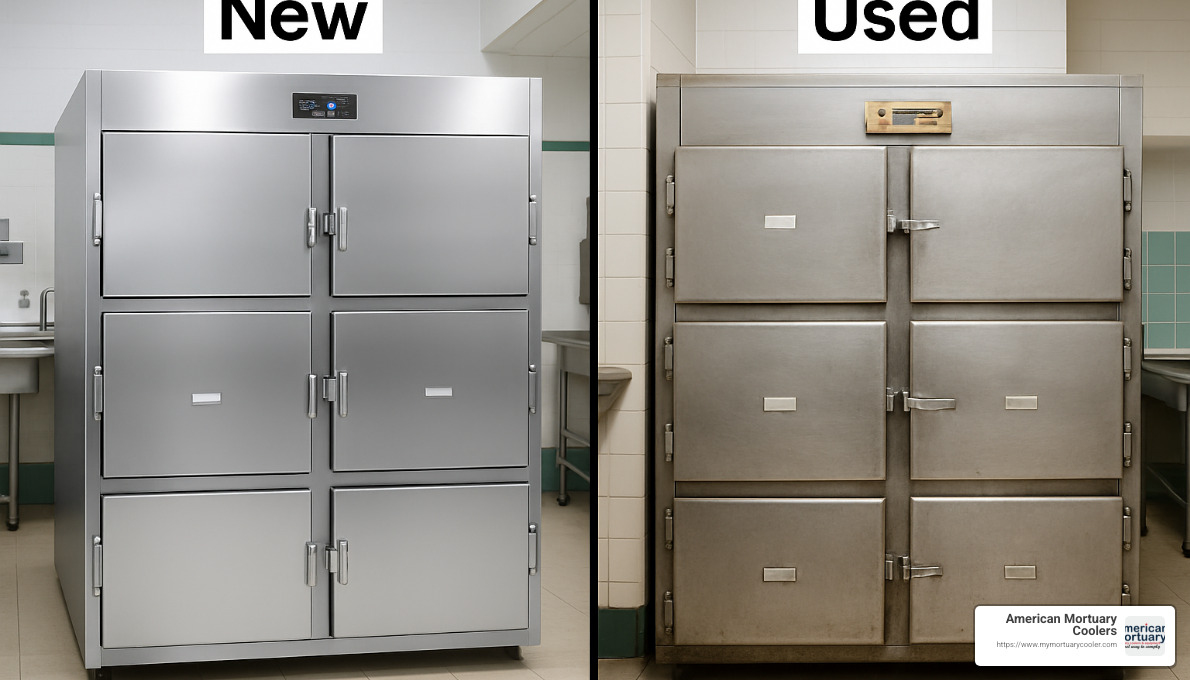
Let's face it – when you're running a funeral home, every budget decision matters. Choosing between a new mortuary cooler and a second hand mortuary fridge isn't just about dollars and cents – it's about balancing immediate needs with long-term reliability. Having helped hundreds of funeral directors make this decision, I've seen both the wins and the occasional headaches that come with each option.
Key Advantages
The financial relief of purchasing used equipment can be substantial. I recently worked with a small-town funeral director who saved nearly 65% by choosing a refurbished 3-body unit instead of new. As he told me, "That money went straight into renovating our viewing room instead." These significant cost savings often make quality refrigeration accessible for businesses that couldn't otherwise afford it.
Time matters in our industry, and second hand mortuary fridges offer the benefit of immediate availability. While custom-built new units typically take 8-12 weeks for delivery, many pre-owned units can be installed within days. This rapid timeline can be a lifesaver when facing unexpected equipment failures or sudden business growth.
The environmental benefits shouldn't be overlooked either. By extending the life of existing equipment, you're keeping perfectly functional stainless steel and components out of landfills. One funeral director I know proudly displays a small "Environmentally Responsible Business" sign in his lobby, noting how their refurbished equipment choices align with their community's values.
There's also something reassuring about equipment with a proven track record. A unit that's been running smoothly for five years in another facility has demonstrated its reliability in real-world conditions. And sometimes, you can score premium features that might be financially out of reach when buying new – like upgraded digital controls or higher-grade stainless steel finishes.
Potential Drawbacks
I always remind my clients that second hand mortuary fridges come with certain realities you need to face head-on. Reliability concerns top the list – an older compressor simply won't have the same expected lifespan as a brand new one. As one experienced funeral director put it to me, "The savings were great, but I budget for more maintenance calls than I did with our new equipment."
Warranty protection is another significant consideration. New units from quality manufacturers typically include 5+ years of comprehensive coverage, while used equipment might come with limited or no warranty protection. This increased financial risk needs to factor into your decision-making.
The energy efficiency gap between old and new refrigeration technology continues to widen. Newer units with modern compressors and improved insulation can significantly reduce your monthly operating costs. One funeral home owner in Georgia shared that his electric bill dropped by nearly $175 monthly after replacing a 12-year-old unit with new equipment.
Hygiene considerations require careful attention. While reputable resellers thoroughly sanitize their units, proper decontamination documentation is essential. Always ask for detailed information about cleaning procedures and any biohazard remediation that's been performed.
Technology evolves quickly in refrigeration. Older units might lack digital temperature monitoring, remote alerts, or other features that not only improve performance but can also help maintain compliance with increasingly stringent regulations. And without complete service records, it's hard to know exactly what you're getting – like buying a used car without knowing if the oil was ever changed.
At American Mortuary Coolers, we believe there's no one-size-fits-all answer. Established funeral homes with technical staff on hand often find tremendous value in quality second hand mortuary fridges. Meanwhile, new businesses or those without maintenance expertise might sleep better knowing they have the reliability and warranty protection of new equipment. Either way, we're here to help you steer the options that make the most sense for your specific situation.
Inspection Checklist Before You Buy a Second Hand Mortuary Fridge
When evaluating a second hand mortuary fridge, a thorough inspection is essential to avoid costly mistakes. You wouldn't buy a used car without looking under the hood, and the same principle applies here—perhaps even more so given the critical nature of mortuary refrigeration.
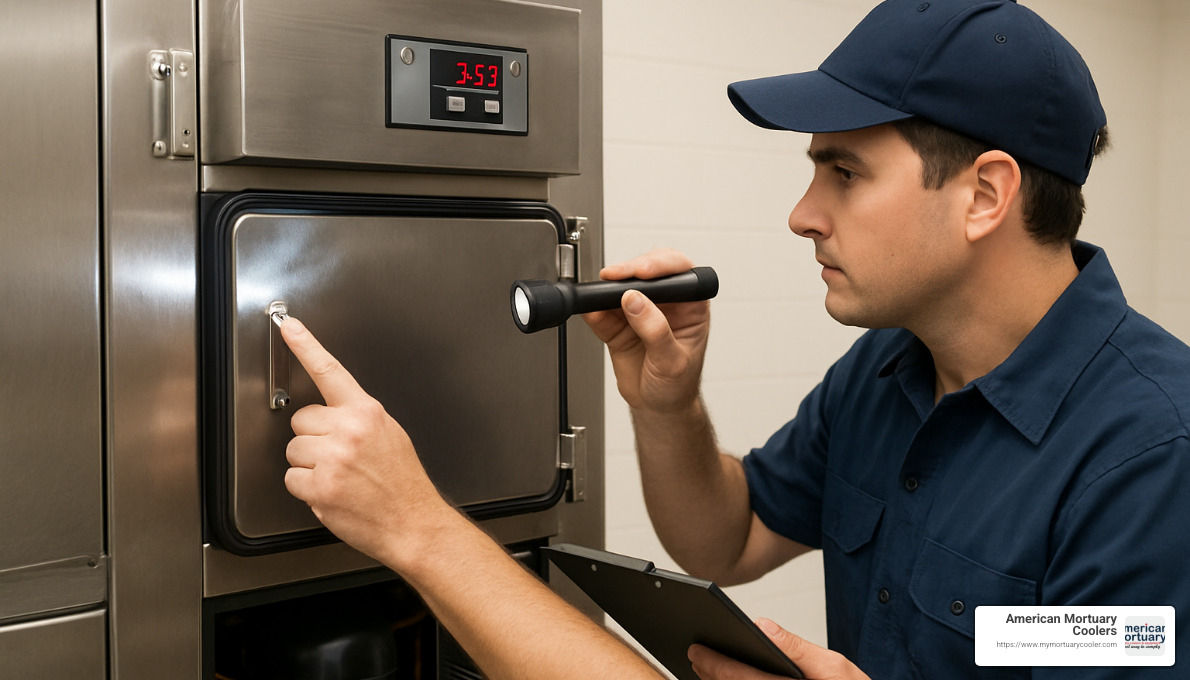
Structural Integrity & Insulation Tests
The foundation of any good mortuary cooler is its physical structure. Start by examining the exterior cabinet condition—look for dents, scratches, or damage to the stainless steel. A few cosmetic blemishes are normal for used equipment, but structural damage is a red flag.
"Is the unit structurally sound? Has the insulation been saturated? Are there any cracks or leaks?" These questions from industry experts highlight what matters most beneath the surface.
When checking the stainless steel, verify it's grade 304 (industry standard) or 316 (premium grade). Run your hands along corner seams, feeling for separation or damage that might compromise the unit's integrity. Don't forget to test those door hinges—they should operate smoothly without wobbling or resistance.
Insulation is the heart of temperature efficiency. The polyurethane insulation should be approximately 80mm thick and show no signs of moisture saturation. Walk around the unit with your hand near (but not touching) the exterior surfaces—you shouldn't feel cold spots, which would indicate insulation failure.
Door seals can make or break a unit's performance. Examine those gaskets carefully for cracks or deformation. A simple "paper test" can tell you a lot—close the door on a piece of paper, then try to pull it out. If it slides out easily, those magnetic seals aren't creating a proper barrier anymore.
Inside the unit, look for any corrosion or pitting on the stainless surfaces. These aren't just cosmetic issues—they can harbor bacteria and make proper sanitization difficult. While you're there, check that the drainage systems aren't blocked and test those body tray slides. They should glide smoothly without catching or jamming.
Temperature Control & Mechanical Health
The mechanical heart of any second hand mortuary fridge deserves special attention. As one industry expert puts it: "When purchasing a used mortuary fridge, it is critical that the mechanicals go through a vigorous inspection and are tested prior to shipment."
Start with the compressor—this is the workhorse of the cooling system. Listen carefully when it's running. A healthy compressor has a steady hum; grinding, clicking, or rattling sounds spell trouble. Premium units often feature SECOP compressors, which are known for their reliability and longevity. Don't be shy about asking for service records to verify maintenance history.
Temperature control accuracy is non-negotiable in mortuary refrigeration. Bring along a calibrated thermometer and compare its readings with what the unit's display shows. The difference should be minimal, ideally less than 1°C. Spend time testing all control functions, especially alarm systems that alert staff to temperature fluctuations.
The refrigeration system itself needs careful scrutiny. Inspect those refrigerant lines for damage or oil stains—these often indicate leaks. Check what type of refrigerant the unit uses; older refrigerants may be difficult or expensive to replace due to environmental regulations. While you're at it, examine the evaporator coils for ice buildup, which suggests defrost cycle problems.
Electrical components aren't as visible but are equally important. Look for any signs of amateur repairs—electrical tape, spliced wires, or mismatched components. Verify the voltage requirements match your facility's electrical system (110V vs. 220V). A current safety certification sticker should be present somewhere on the unit.
Ideally, you'll want to run the unit for at least 24 hours before committing. This performance testing period reveals how the fridge handles in real-world conditions. Monitor how stable the temperature remains and how quickly it recovers after door openings.
At American Mortuary Coolers, we've seen too many funeral homes learn expensive lessons from skipping proper inspections. If possible, bring along a refrigeration technician who specializes in mortuary equipment—their trained eye can spot subtle issues that might cost thousands in repairs down the road.
A thorough inspection isn't about being picky—it's about ensuring dignity for the deceased and peace of mind for your funeral home. A well-inspected second hand mortuary fridge can provide years of reliable service when you know exactly what you're getting.
Regulations, Hygiene & Safety Standards
When purchasing second hand mortuary fridges, understanding and complying with relevant regulations isn't just about checking boxes—it's about ensuring your operation is safe, legal, and respectful of the deceased in your care. These specialized units must meet specific standards even when they're pre-owned.
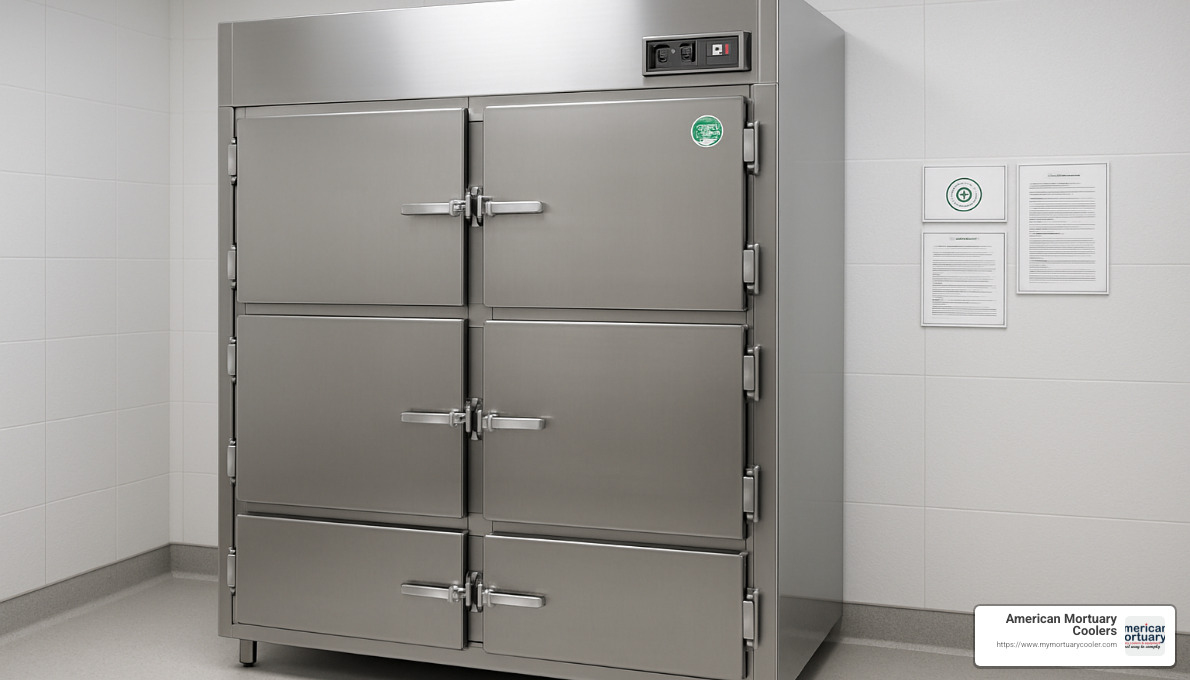
Compliance for Second Hand Mortuary Fridges
The regulatory landscape might seem intimidating at first, but breaking it down makes it manageable. In the U.S., several key frameworks guide our industry. OSHA's Bloodborne Pathogens Standard sets clear expectations for how we handle potential biohazards, while UL 471 certification ensures electrical components meet safety requirements. Various state and local health codes dictate temperature performance standards, and while not strictly required, ISO 9001:2008 certification offers valuable quality assurance.
Our European colleagues face similar but distinct requirements—EU Directive 2000/54/EC for biohazard management, CE Marking and Low Voltage Directive for electrical safety, and EN 285:2015 for temperature performance standards.
"ISO 9001:2008 certification is highlighted as a quality guarantee," notes one industry source, speaking to the importance of quality management systems in our specialized field.
When you're eyeing that used mortuary refrigerator, don't be shy about requesting documentation. Ask for the original manufacturer's paperwork, service records, previous certification documents, serial numbers, manufacturing dates, and decontamination certificates. These papers tell the story of the unit's life and help ensure you're making a sound investment.
As one of our industry colleagues wisely advises, "Verify that insulation is not saturated and there are no cracks or leaks in a used unit." This isn't just about getting good performance—it's about meeting regulatory requirements for temperature stability that protect both your staff and the deceased in your care.
| Regulatory Area | U.S. Requirements | EU Requirements |
|---|---|---|
| Biohazard Management | OSHA Bloodborne Pathogens Standard | EU Directive 2000/54/EC |
| Electrical Safety | UL 471 (Commercial Refrigerators) | CE Marking, Low Voltage Directive |
| Temperature Performance | State/Local Health Codes | EN 285:2015 |
| Quality Management | ISO 9001:2008 (recommended) | ISO 9001:2008 (recommended) |
Cleaning & Disinfection Protocols
Let's talk frankly about a topic some folks find uncomfortable: proper decontamination. When dealing with second hand mortuary fridges, thorough cleaning isn't just good practice—it's essential for safety and peace of mind.
The decontamination process starts with a careful assessment of visible contamination and damage. Then comes the physical cleaning—removing all trays and components to clean them separately. Next, apply a hospital-grade disinfectant (typically a 10% chlorine solution) and allow it proper dwell time. Thorough rinsing and drying follow, and ideally, you'll validate your efforts with ATP swab testing to verify effectiveness. Finally, document everything—good record-keeping protects everyone involved.
"Used units may contain residual hazardous waste and require a thorough cleaning," warns an industry publication. It's a straightforward reminder that proper decontamination isn't optional when purchasing used equipment.
When cleaning or inspecting a used mortuary refrigerator, protect yourself with appropriate gear. Disposable gloves, protective eyewear, fluid-resistant coveralls, and possibly respiratory protection if you're using strong chemicals are all part of responsible handling.
At American Mortuary Coolers, we've seen the good, the bad, and the occasionally scary when it comes to used equipment. Our friendly advice? Always request documentation of professional decontamination before accepting delivery. If that paperwork isn't available, budget for professional cleaning services before installation. Your staff's safety and your peace of mind are worth the investment.
Delivery, Installation & Maintenance Best Practices
Getting your second hand mortuary fridge from point A to point B—and then keeping it running smoothly—is just as important as making a good purchase in the first place. Let's walk through the practical aspects of bringing your used equipment home and ensuring it serves you reliably for years to come.
Transport & Setup Tips
Moving a mortuary refrigerator isn't quite like moving your kitchen fridge. These specialized units are heavier, more delicate, and require careful handling to prevent damage to their cooling systems.
Before your unit arrives, take time to map out its journey to its final location. I've seen too many funeral directors face the heartbreak of a unit that won't fit through a doorway or down a stairwell. Measure every doorway, hallway, and elevator along the path. Remember to account for the unit's height when standing upright—those ceiling fans and light fixtures can become unexpected obstacles!
"Will delivery and installation be easy and affordable?" This question from an industry guide really gets to the heart of the matter. Planning ahead can save you thousands in unexpected costs and headaches.
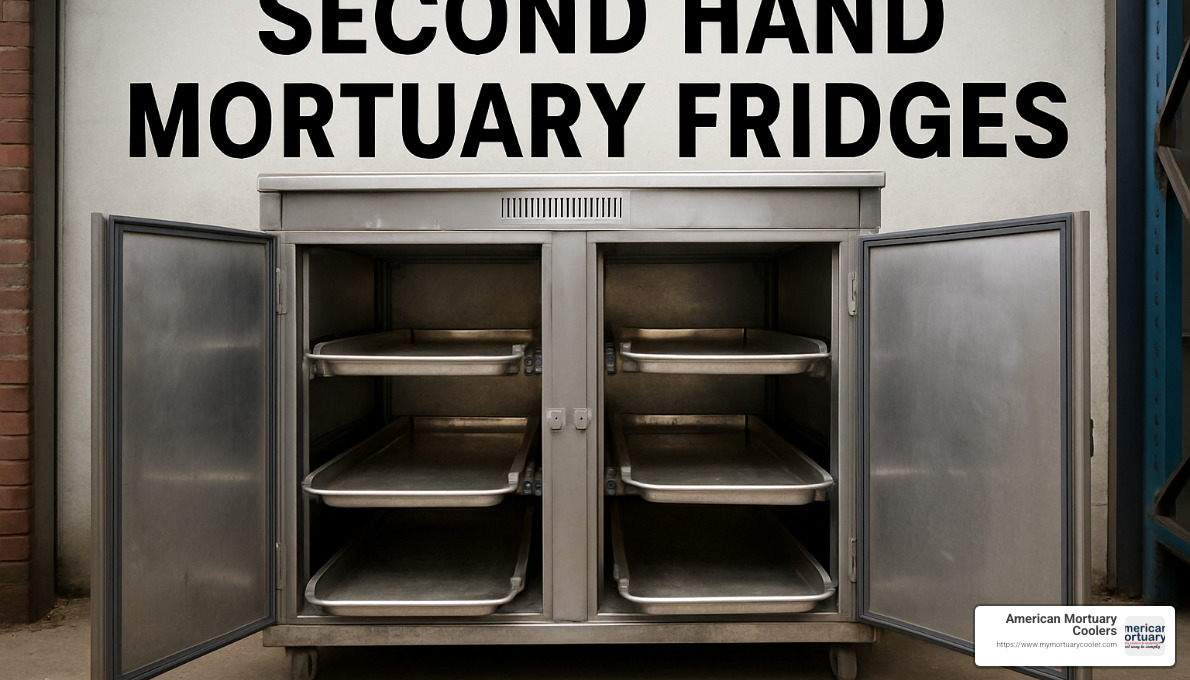
When scheduling delivery, consider timing it during your facility's quieter hours. There's nothing more awkward than trying to maneuver a mortuary cooler through your building while families are present for viewings or services. Your delivery team will need proper equipment—typically a lift-gate truck, pallet jack, and possibly a forklift for larger units. Don't forget to check your floor's load capacity, especially for those bigger 6-body or walk-in units.
Once in position, give your second hand mortuary fridge some breathing room—at least 12 inches of clearance all around for proper ventilation. This isn't just about performance; it's about longevity. A unit that can't dissipate heat properly will work harder, use more energy, and fail sooner.
The electrical setup matters tremendously too. Most mortuary coolers require a dedicated circuit, and you'll need to verify whether your unit needs 110V or 220V power. Using the wrong voltage can destroy your compressor in seconds—a costly mistake that's entirely preventable.
One tip we often share at American Mortuary Coolers: if your unit was transported horizontally (lying down), let it stand upright for at least 24 hours before powering it on. This allows the refrigerant and oils to settle back into their proper places within the system.
Before putting your cooler into service, follow this simple first-use protocol:
- Give the interior a thorough cleaning and sanitization
- Run the empty unit for 24 hours to verify it maintains stable temperature
- Check and calibrate temperature controls if needed
- Test all features and functions one by one
- Document your baseline performance readings for future reference
This initial testing period gives you peace of mind and establishes a performance baseline you can refer to later.
Preventive Maintenance Plan
A well-maintained second hand mortuary fridge can provide many years of reliable service. The key is consistency—regular maintenance prevents small issues from becoming major failures.
Your cooling coils are the heart of your refrigeration system. When dust and debris build up on these coils, your unit works harder, uses more electricity, and ages faster. A quarterly coil cleaning is one of the simplest yet most effective maintenance tasks you can perform. This alone can extend your unit's lifespan by years.
Door gaskets are another critical component. These rubber seals keep cold air in and warm air out. Check them monthly for cracks, tears, or deformation. A failing gasket means higher energy bills and potential temperature stability issues. Fortunately, replacing gaskets is relatively inexpensive compared to the problems they can cause when neglected.
Temperature accuracy is non-negotiable in our industry. Use a calibrated thermometer to verify your unit's actual temperature weekly, regardless of what the display shows. Digital controllers can drift over time, and this simple check can catch potential issues before they affect your ability to provide proper care.
"Operations and maintenance issues should be addressed to avoid excessive energy use and costly repairs," notes a refrigeration expert. This wisdom is especially relevant for second-hand equipment, which may have higher maintenance needs than brand-new units.
Keeping detailed records is a practice that separates successful long-term operations from those constantly dealing with emergencies. Maintain a maintenance log that tracks all service visits, repairs, temperature readings, and even energy consumption. These records help identify patterns and potential issues before they become critical failures.
At American Mortuary Coolers, we've seen how a modest investment in preventive maintenance can save thousands in emergency repairs and downtime. Consider establishing a service contract with a qualified refrigeration specialist who understands the unique requirements of mortuary equipment. The peace of mind alone is worth it, but the extended equipment life and reduced emergency calls make it a smart financial decision too.
Your second hand mortuary fridge has already lived part of its life elsewhere. With proper care and attention, you can ensure its second chapter with your facility is a long and reliable one.
Where to Source Reputable Second Hand Mortuary Fridges
Finding a reliable second hand mortuary fridge doesn't have to feel like searching for a needle in a haystack. With the right resources and a bit of know-how, you can find quality pre-owned units that meet your needs without breaking the bank.
Trusted Marketplaces & Classifieds
The digital marketplace has made finding specialized equipment like mortuary refrigeration more accessible than ever before. eBay has become a surprisingly robust platform for these specialized units, offering buyer protection that adds peace of mind to your purchase. I recently tracked a fascinating auction where a used morgue refrigerator sold for $3,049 after a heated 68-bid competition – showing just how active this market can be!
Machinio serves as another valuable resource, specializing in industrial equipment including mortuary refrigeration. For those who prefer to keep things local, Facebook Marketplace often features nearby options that allow you to inspect units in person before committing – always my recommended approach when possible.
If you're comfortable navigating international waters, platforms like Alibaba and AliExpress offer options, though I'd approach these with extra caution regarding shipping logistics and compliance with U.S. standards.
Don't overlook industry-specific resources either. Publications like Funeral Director Magazine and Mortuary Management feature classified sections specifically designed for funeral professionals. As one industry board proudly states, "This area is designed to be used for FREE by funeral directors and associates to sell second hand equipment." These peer-to-peer connections often lead to the most straightforward and transparent transactions.
Local opportunities frequently fly under the radar but can be goldmines for quality equipment. Keep an eye out for hospital equipment auctions, healthcare facility liquidations, funeral home closures, and even university surplus sales. These local sources often offer exceptional value since the sellers aren't specialized in mortuary equipment marketing.
Working With Certified Refurbishers
For many funeral directors, especially those without technical expertise, working with professional refurbishers strikes the perfect balance between savings and reliability. These specialists take previously-owned mortuary refrigeration units and bring them back to their former glory.
A good refurbisher doesn't just clean and sell – they conduct thorough mechanical inspections, replace worn components, properly decontaminate all surfaces, and often provide warranties ranging from 90 days to a full year. Many also offer installation assistance and ongoing technical support that can prove invaluable.
"When purchasing a used mortuary fridge, it is critical that the mechanicals go through a vigorous inspection and are tested prior to shipment," as one experienced industry professional told me. This attention to detail separates reputable refurbishers from those simply flipping equipment.
Before committing to a refurbisher, ask pointed questions about their process: How thorough is their inspection? Will you receive a detailed condition report? Which components have been replaced? What warranty protection is included? Can they help with delivery and setup? The answers will tell you everything you need to know about their professionalism.
At American Mortuary Coolers, while we specialize in crafting new custom-built units, we've developed relationships with several trustworthy refurbishers across our service regions. We're happy to point customers seeking second hand mortuary fridges toward reliable sources when it makes sense for their specific needs and budget constraints. After all, we believe every funeral home deserves quality refrigeration equipment, whether it comes fresh from our workshop or from a properly refurbished pre-owned unit.
For more insights on finding great deals, check out our guide on Pre-Owned Preservation: Tips for Buying Used Mortuary Coolers.
Frequently Asked Questions about Second Hand Mortuary Fridges
After helping countless funeral homes find the right cooling solutions, we've gathered the most common questions people ask about second hand mortuary fridges. Let's address these concerns with straightforward answers based on our industry experience.
Do used units come with warranties?
When it comes to warranties on second hand mortuary fridges, what you get largely depends on who you buy from.
If you're purchasing from a private seller, you'll typically get the unit "as-is" with no warranty protection. This is the riskiest option, but often comes with the lowest price tag.
Refurbishers usually offer more peace of mind with limited warranties covering 30-90 days on parts and labor. Equipment dealers might go further, providing 6-12 month limited warranties on what they call "certified pre-owned" units.
In some lucky cases, newer used units might have transferable manufacturer warranties still in effect. Always ask the seller: "Is there a warranty, and what exactly does it include?"
Pay close attention to which components are covered (is the compressor included?), whether labor costs are covered, how quickly they'll respond to issues, who actually performs the warranty service, and what documentation you'll need to make a claim.
At American Mortuary Coolers, we generally suggest setting aside some budget for potential repairs during your first year of ownership if you purchase a used unit without comprehensive warranty coverage. Think of it as self-insurance against unexpected issues.
How can I verify temperature accuracy before purchase?
Temperature accuracy isn't just a technical detail—it's absolutely essential for proper preservation. Here's how to check before you commit to buying:
First, ask for recent temperature logs or service records that show the unit has been maintaining proper temperatures. Bring your own calibrated thermometer when inspecting the unit to compare against the built-in display—they should match closely.
If possible, monitor the unit over several hours to check its stability. The best test is to place something at room temperature inside and see how quickly the unit brings it down to proper preservation temperature. Also try opening and closing the doors a few times to simulate daily use and verify the recovery time.
A properly functioning second hand mortuary fridge should maintain temperatures within ±1°C of whatever you set it to, recover quickly after door openings, display accurate readings, and have working alarms that trigger if temperatures drift outside safe ranges.
As one industry reference notes, "Temperature control range typically from –15 °C to 5 °C across models," but the actual performance can vary significantly based on the unit's condition and calibration. Don't just take the seller's word for it—verify performance yourself whenever possible.
What are the biggest risks of buying sight-unseen?
Buying a second hand mortuary fridge without seeing it in person is something we generally don't recommend, but we understand sometimes it's unavoidable. Here are the biggest risks you should be aware of:
Undisclosed damage is perhaps the most common issue—photos can hide cosmetic problems, but more importantly, they might conceal structural issues that affect performance or lifespan. Decontamination concerns are particularly important in our industry; without seeing the unit, you can't verify it's been properly cleaned of biohazardous materials.
Sellers sometimes misrepresent the condition of units, making them sound newer or better-maintained than they actually are. Even honest sellers might not mention compatibility issues with electrical requirements or physical dimensions that could make the unit unworkable in your facility.
Then there's transportation damage—even a perfectly good unit can arrive damaged if improperly packed or handled during shipping. And perhaps most troubling are hidden mechanical problems that only become apparent once you start using the unit.
As one of our industry colleagues puts it: "When considering a previously owned refrigeration unit, you should ask yourself about the lifespan, structural soundness, warranty, and whether the unit will handle all the requirements of your facility."
If you must buy sight-unseen, protect yourself by requesting detailed photos and videos of the unit in operation. Ask for service records and maintenance history. Verify exact dimensions and electrical requirements. Use payment methods that offer buyer protection, and if the purchase price justifies it, consider hiring a local refrigeration technician to inspect the unit at the seller's location before you commit.
At American Mortuary Coolers, we understand budget constraints sometimes make second-hand equipment necessary. We're always happy to offer advice on evaluating used equipment, even if you don't end up purchasing new from us. What matters most is that you get reliable equipment that serves your clients with dignity.
Conclusion
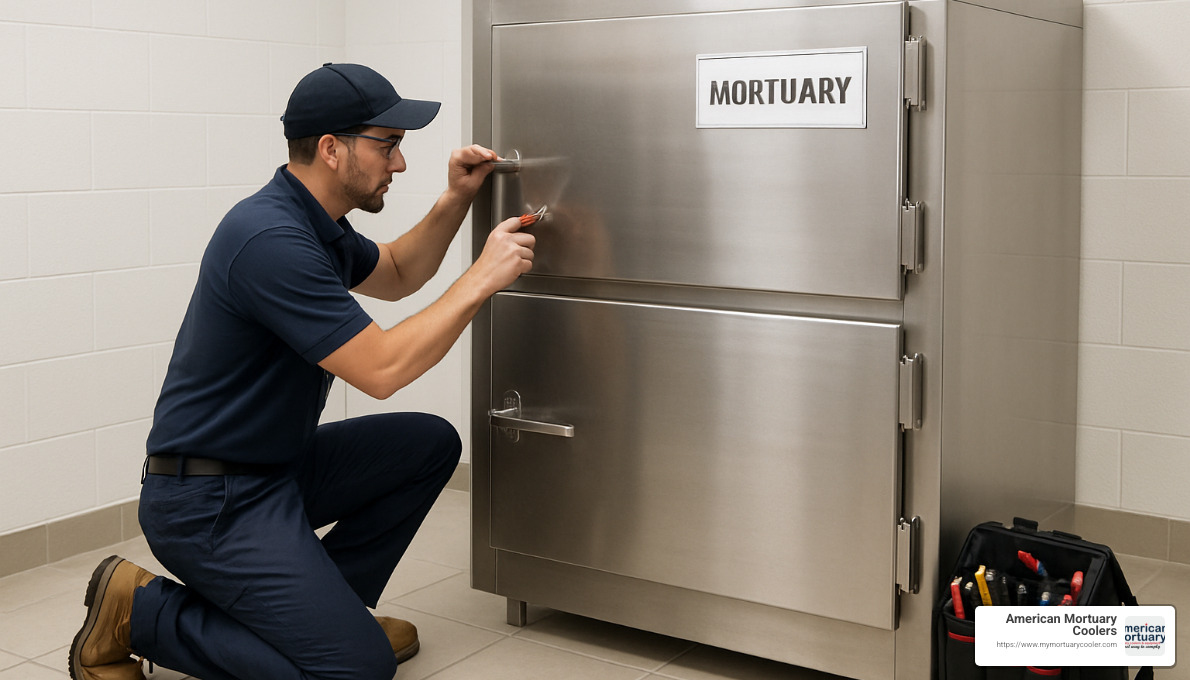
Finding the right second hand mortuary fridge is a bit like finding a reliable used car – it takes some know-how, careful inspection, and asking the right questions. Throughout this guide, we've walked through everything you need to make a confident decision that balances your budget with the critical need for dependable preservation equipment.
The financial appeal is clear – you can save anywhere from 40-70% compared to buying new. For many funeral homes, especially smaller operations or those facing unexpected equipment failures, these savings can make a tremendous difference to your bottom line. But as we've seen, the decision involves more than just price.
Thorough inspection we talked about? It's not just a suggestion – it's absolutely essential. Taking the time to check structural integrity, test temperature controls, and evaluate mechanical components can save you from headaches down the road. I've seen too many funeral directors regret skipping this step when faced with unexpected repairs just months after purchase.
Where you buy matters tremendously. A reputable refurbisher or established industry seller will typically provide better assurance than an unknown private seller on a general marketplace. They've usually done the work of testing, cleaning, and often replacing worn components – giving you greater peace of mind.
Always request (and keep!) proper documentation. Service records, decontamination certificates, and any warranty information aren't just paperwork – they're your protection. These documents tell the story of the unit's past life and can help predict its future reliability.
When calculating costs, look beyond the initial price tag. Delivery, installation, potential early repairs, and ongoing maintenance all contribute to the true cost of ownership. I always suggest my clients set aside a maintenance fund when purchasing used equipment – it's better to have it and not need it than the alternative.
One benefit that's often overlooked is the environmental impact. By giving existing equipment a second life, you're making a meaningful contribution to sustainability efforts. It's a small but significant way your funeral home can reduce its environmental footprint while still providing excellent care.
At American Mortuary Coolers, we understand that every funeral home has unique needs. While we take pride in our custom-built American-made coolers, we recognize that second hand mortuary fridges are the right choice for many facilities. Our team across our locations in Johnson City TN, Atlanta GA, Chicago IL, Columbia SC, Dallas TX, Los Angeles, New York NY, Pittsburgh PA, and our regional centers is always available to help you evaluate your specific situation.
We've guided countless funeral directors through this decision process, and we're happy to help you too – whether that ultimately leads to one of our custom solutions or points you toward a quality used unit that better fits your immediate needs.
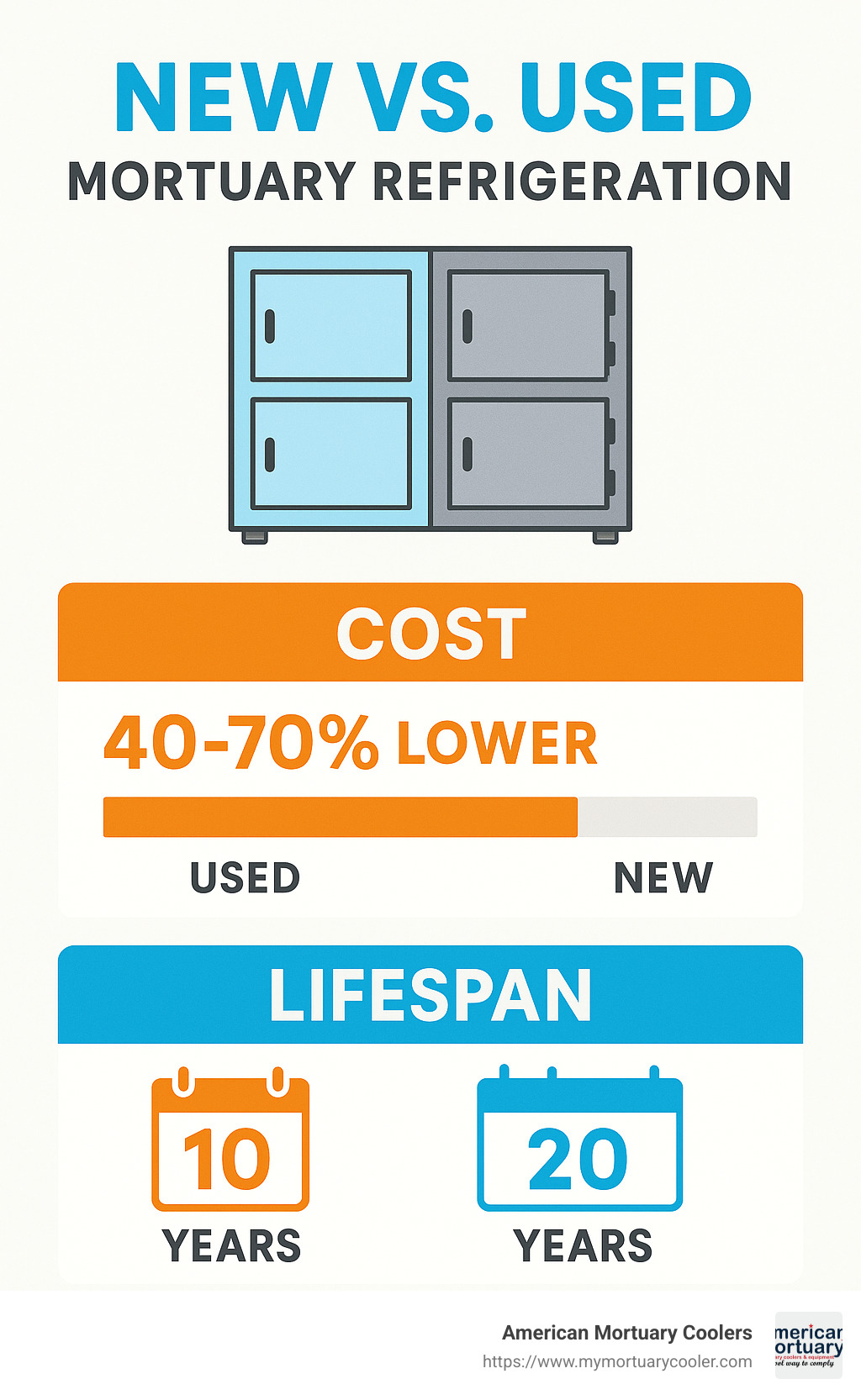
For those interested in exploring our custom-built options, we welcome you to reach out. Our American-made mortuary coolers can be custom to your exact specifications, with direct delivery available throughout the contiguous 48 states. But regardless of which path you choose, we hope this guide has given you the confidence to make the right choice for your facility, your budget, and the families you serve.



















